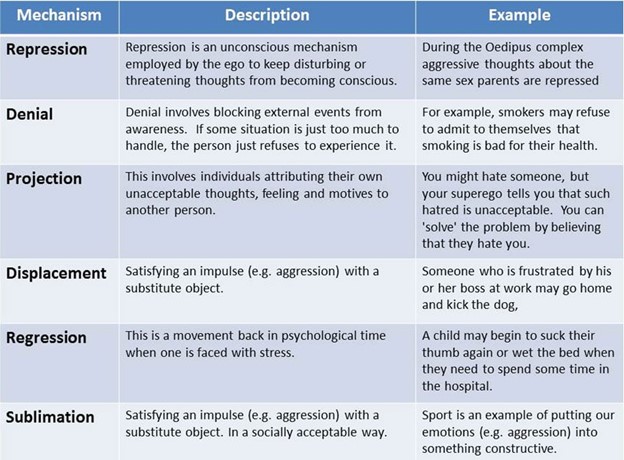A nurse at a college campus mental health counseling center is caring for a student who just failed an examination. The student spends the session berating the teacher and the course. The nurse should recognize this behavior as which of the following defense mechanisms?
Regression
Conversion
Projection
Undoing
The Correct Answer is C
A. Regression: Incorrect
Regression is a defense mechanism in which a person reverts to an earlier stage of development in response to stress or anxiety. For example, an adult might start behaving like a child when faced with a difficult situation. In this case, the student berating the teacher doesn't demonstrate a return to an earlier developmental stage, so regression is not the correct choice.
B. Conversion: Incorrect
Conversion refers to the conversion of emotional distress into physical symptoms, such as experiencing physical pain without any apparent physical cause. This mechanism is often seen in conditions like conversion disorder. The student berating the teacher is not exhibiting physical symptoms as a response to emotional distress, so conversion is not the correct choice.
C. Projection: Correct
Projection is the act of attributing one's own unacceptable feelings or thoughts to another person. In this scenario, the student is projecting their own failure onto the teacher and the course by blaming them for the failure. They are unable to accept their own role in the failure and are instead placing the blame on external factors. This aligns with the behavior described in the scenario.
D. Undoing: Incorrect
Undoing involves trying to compensate for or negate an unacceptable action or thought with a contrary action. For instance, someone who had angry thoughts might engage in excessive acts of kindness to "undo" those thoughts. The student berating the teacher is not engaging in actions to negate their negative feelings or thoughts; they are expressing their frustration directly.

Nursing Test Bank
Naxlex Comprehensive Predictor Exams
Related Questions
Correct Answer is ["C","D","E"]
Explanation
Fine hand tremors and pill rolling are not indicative of tardive dyskinesia. These symptoms are more commonly associated with other neurological or movement disorders.
B. Urinary retention and constipation:
Urinary retention and constipation are not symptoms of tardive dyskinesia. These symptoms are more related to anticholinergic effects of certain medications.
C. Facial grimacing and eye blinking:
Facial grimacing and repetitive, involuntary movements such as eye blinking are characteristic of tardive dyskinesia. These abnormal movements of the face and eyes are commonly seen in individuals who have been on long-term antipsychotic medications, especially older ones like haloperidol.
D. Involuntary pelvic rocking and hip thrusting movements:
TD often includes repetitive, purposeless movements of the limbs, trunk, and pelvis.
E. Tongue thrusting and lip-smacking:
Tongue thrusting and lip-smacking are classic symptoms of tardive dyskinesia. These repetitive, involuntary movements involving the mouth and tongue are often observed in individuals who have been on antipsychotic medications for an extended period of time.
Correct Answer is D
Explanation
A. "Let's try to find ways to incorporate your partner's favorite food into her diet plan."
While it's important to consider the client's preferences, dietary restrictions are often in place for specific health reasons. Trying to incorporate forbidden foods into the diet plan might compromise the client's health and recovery.
B. "Why would you want to put your partner's health at further risk?"
This response is confrontational and may not foster a productive conversation with the partner. It's important to address the situation professionally and collaboratively.
C. "Everyone likes food from home, but it can delay your partner's recovery."
While this response acknowledges the partner's feelings, it's essential to communicate more directly about involving the healthcare provider in decisions about the client's diet.
"D. You will need to discuss your concerns about your partner's diet with the provider."
Explanation: In matters involving a client's dietary plan and health, it's important to involve the healthcare provider to make informed decisions. The nurse should guide the partner to communicate their concerns with the provider who has the authority to evaluate the situation, consider the dietary restrictions, and make a decision that aligns with the client's health and recovery.
Whether you are a student looking to ace your exams or a practicing nurse seeking to enhance your expertise , our nursing education contents will empower you with the confidence and competence to make a difference in the lives of patients and become a respected leader in the healthcare field.
Visit Naxlex, invest in your future and unlock endless possibilities with our unparalleled nursing education contents today
Report Wrong Answer on the Current Question
Do you disagree with the answer? If yes, what is your expected answer? Explain.
Kindly be descriptive with the issue you are facing.
